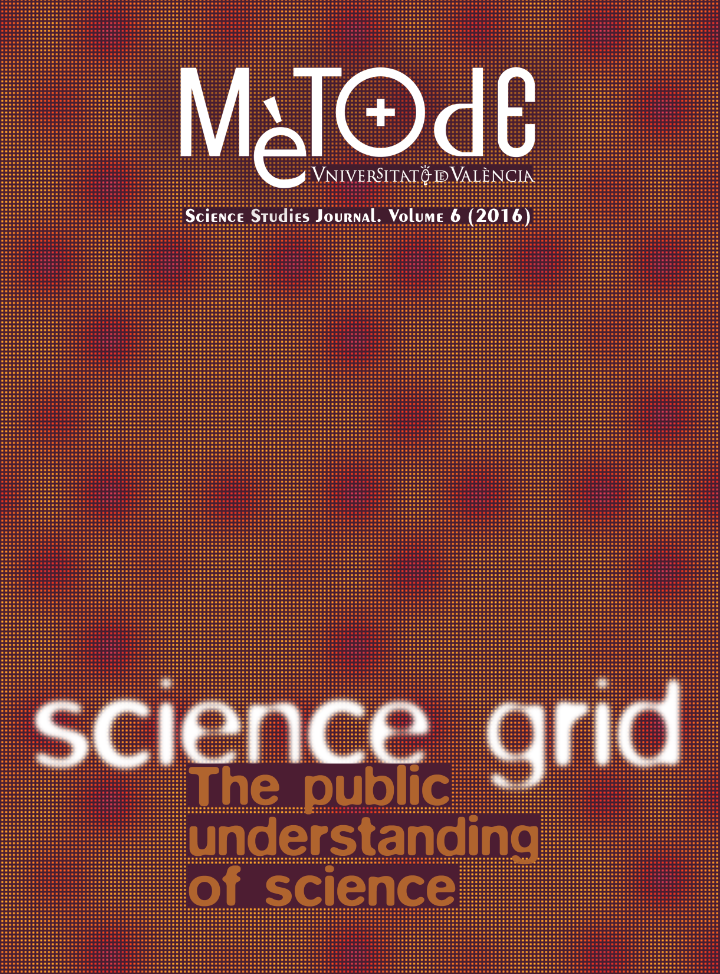Titan’s organic chemistry: A planetary-scale laboratory to study primitive Earth
DOI:
https://doi.org/10.7203/metode.6.4999Keywords:
Titan, natural satellites, atmosphere, organic chemistry Abstract
Abstract
Saturn’s largest satellite, Titan, has been revealed by extended ground-based and space observations, and recently by the Cassini-Huygens mission. Titan’s atmosphere hosts a complex organic chemistry in the solar system starting with nitrogen and methane and leading to the formation of hydrocarbons and nitriles, including prebiotic molecules. The atmosphere also contains traces of oxygen compounds. This system is subject to seasonal variations and different physical, dynamic, and photochemical processes. Interactions between the atmosphere, the surface, and the interior also play an important role in the astrobiological potential of the satellite.
 Downloads
Downloads
 References
References
Coll, P., Guillemin, J. C., Gazeau, M. C., & Raulin, F. (1999). Report and implications of the first observation of C4N2 in laboratory simulations of Titan’s atmosphere. Planetary and Space Science, 47, 1433–1440. doi: 10.1016/S0032-0633(99)00069-0
Coustenis, A., & Encrenaz, Th. (2013). Life beyond Earth: The search for habitable worlds in the universe. Cambridge: Cambridge University Press.
Coustenis, A., Salama, A., Lellouch, E., Encrenaz, Th., Bjoraker, G. L., Samuelson, R. E., … Kessler, M. F. (1998). Evidence for water vapor in Titan’s atmosphere from ISO/SWS data. Astronomy and Astrophysics, 336(3), L85–L89.
Coustenis, A., Bampasidis, G., Achterberg, R. K., Lavvas, P., Jennings, D. E., Nixon, C. A., … Stamogiorgos, S. (2013). Evolution of the stratospheric temperature and chemical composition over one Titanian year. The Astrophysical Journal, 779, 177–185. doi: 10.1088/0004-637X/779/2/177
Coustenis, A., Jennings, D. E., Achterberg, R. K., Bampasidis, G., Lavvas, P., Nixon, C. A., … Flasar, F. M. (2015). Titan’s temporal evolution in stratospheric trace gases near the poles. Icarus. doi: 10.1016/j.icarus.2015.08.027
Flasar, F. M., Achterberg, R. K., Conrath, B. J., Gierasch, P. J., Kunde, V. G., Nixon, C. A., … Wishnow, E. H. (2005). Titan’s atmospheric temperatures, winds, and composition. Science, 308(5724), 975–978. doi: 10.1126/science.1111150
Fulchignoni, M., Ferri, F., Angrilli, F., Ball, A. J., Bar-Nun, A., Barucci, M. A., … ZRNAecki, J. C. (2005). In situ measurements of the physical characteristics of Titan’s environment. Nature, 438, 785–791. doi: 10.1038/nature04314
Iess, L., Jacobson, R. A., Ducci, M., Stevenson, D. J., Lunine, J. I., Armstrong, J. W., … Tortora, P. (2012). The tides of Titan. Science, 337(6093), 457–459. doi: 10.1126/science.1219631
Israël, G., Szopa, C., Raulin, F., Cabane, M., Niemann, H. B., Atreya, S. K., … Vidal-Madjar, C. (2005). Complex organic matter in Titan’s atmospheric aerosols from in situ pyrolysis and analysis. Nature, 438, 796–799. doi: 10.1038/nature04349
McKay, C. (2005, November 3). Titan: Greenhouse and anti-greenhouse. Astrobiology Magazine. Retrieved from http://www.astrobio.net/topic/solar-system/saturn/titan/titan-greenhouse-and-anti-greenhouse/
Niemann, H. B., Atreya, S. K., Bauer, S. J., Carignan, G. R., Demick, J. E., Frost, R. L., … Way, S. H. (2005). The abundances of constituents of Titan’s atmosphere from the GCMS instrument on the Huygens probe. Nature, 438, 779–784. doi: 10.1038/nature04122
Niemann, H. B., Atreya, S. K., Demick, J. E., Gautier, D., Haberman, J. A., Harpold, D. N., … Raulin, F. (2010). Composition of Titan’s lower atmosphere and simple surface volatiles as measured by the Cassini-Huygens probe gas chromatograph mass spectrometer experiment. Journal of Geophysical Research, 115(12), 2156-2202. doi: 10-1029/2010JE003659
Porco, C. C., Baker, E., Barbara, J., Beurle, K., Brahic, A., Burns, J. A., … West, R. (2005). Imaging of Titan from the Cassini spacecraft. Nature, 434, 159–168. doi: 10.1038/nature03436
Raulin, F. (2008). Planetary science: Organic lakes on Titan. Nature, 454, 587–589. doi: 10.1038/454587a
Tomasko, M. G., Archinal, B., Becker, T., Bézard, B., Bushroe, M., Combes, M., … West, R. (2005). Rain, winds and haze during the Huygens probe’s descent to Titan’s surface. Nature, 438, 765–778. doi: 10.1038/nature04126
Waite, J. H., Young, D. T., Cravens, T. E., Croates, A. J., Crary, F. J., Magee, B., & Westlake, J. (2007). The process of tholin formation in Titan’s upper atmosphere. Science, 316(5826), 870–875. doi: 10.1126/science.1139727
Downloads
Published
How to Cite
-
Abstract732
-
PDF326
Issue
Section
License
![]()
All the documents in the OJS platform are open access and property of their respective authors.
Authors publishing in the journal agree to the following terms:
- Authors keep the rights and guarantee Metode Science Studies Journal the right to be the first publication of the document, licensed under a Creative Commons Attribution-NonCommercial-NoDerivatives 4.0 International License that allows others to share the work with an acknowledgement of authorship and publication in the journal.
- Authors are allowed and encouraged to spread their work through electronic means using personal or institutional websites (institutional open archives, personal websites or professional and academic networks profiles) once the text has been published.





